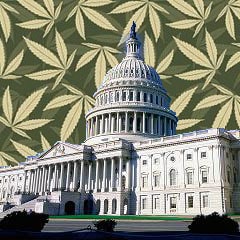
How much longer Until Politicians Change Outdated Marijuana Laws??
By Johnny Green
When asked, ‘When will weed be legal?’ most people would answer with ‘very soon.’ And why wouldn’t they? It seems like more and more people are toking down everyday, and that the public mood is shifting more and more toward legalization. The benefits of legalization are so numerous that I could write for days. However, marijuana prohibition is built around laws, and changing laws is not as easy as it seems.
In order to understand where America needs to go on marijuana policy one first needs to understand where it came from. Marijuana has been illegal for a long, long time. The Marijuana (Marihuana) Tax Act of 1937 made it a crime to possess marijuana in any form without a marijuana tax stamp. The tax stamps were of course never distributed, creating a functional prohibition. States also created their own laws to mimic the federal penalties. In 1969, Timothy Leary successfully won a Supreme Court case that declared the Marijuana Tax Act unconstitutional. The Nixon Administration answered back the next year with the current federal marijuana laws. Since then, some states have softened up laws to treat it as a decriminalized offense. However, a vast majority of states still treat it as a misdemeanor or felony.
 The reason that such illogical laws have been able to persist for so many decades is because creating knee-jerk reaction laws is fairly easy; changing existing laws is hard to do. When laws are not only passed, but are implemented and enforced, it is very difficult to get change by succeeding at the political process, convincing society to go with the change, and implement that change. That’s why so many measures/propositions/initiatives get defeated each year, and so few get passed. Humans like complacency, even when it goes against their overall goals. Humans fear change, even if it is logical.
The reason that such illogical laws have been able to persist for so many decades is because creating knee-jerk reaction laws is fairly easy; changing existing laws is hard to do. When laws are not only passed, but are implemented and enforced, it is very difficult to get change by succeeding at the political process, convincing society to go with the change, and implement that change. That’s why so many measures/propositions/initiatives get defeated each year, and so few get passed. Humans like complacency, even when it goes against their overall goals. Humans fear change, even if it is logical.
How would legalization come about, assuming it will happen soon? Almost anyone I know would say that the president is going to finally decide that it should happen, and declare it so. Anyone who has studied politics and law knows that this can’t happen, even if the president wanted it to (which he clearly doesn’t despite his BS rhetoric). A Presidential Executive Order cannot override an Act of Congress. It violates constitutional requirements of bicameralism. The only other options are if the United States Supreme Court decided that the Nixon era legislation is unconstitutional (I wouldn’t hold my breath even if I was paid a million dollars) or Congress can fix it’s mistake and create a new, sensible law.
However, waiting for the United States Congress to act is one of the most frustrating, pointless activities in America. There are 535 members involved, and they all have their own agendas. Even more importantly, hardly any of them have the courage to step up for what’s right and logical in regards to marijuana policy. That’s not to say that there aren’t a handful every now and then that believe in legalization (almost always in the House). Earl Blumenauer (D-OR) broke it down to Ninjasmoker the best way I can illustrate it. He said that if there was an anonymous vote in Congress to legalize marijuana, it would pass by an overwhelming margin. But when the elected officials have to go on record, most members of Congress wouldn’t even consider showing up for a discussion. They are scared to put their reputation on the line, plain and simple.
 You can see that this is a dire situation. The feds have marijuana consumers by the stones. However, there is one other thing that can occur (it’s the ‘secret’ third option that I didn’t allude to earlier…). The way marijuana will become legal is by a progressive change in marijuana policy one state at a time, one election at a time via the initiative/proposition/measure system. State legislatures will not legalize marijuana; the citizens have to take matters into their own hands and do it themselves.
You can see that this is a dire situation. The feds have marijuana consumers by the stones. However, there is one other thing that can occur (it’s the ‘secret’ third option that I didn’t allude to earlier…). The way marijuana will become legal is by a progressive change in marijuana policy one state at a time, one election at a time via the initiative/proposition/measure system. State legislatures will not legalize marijuana; the citizens have to take matters into their own hands and do it themselves.
To make matters more complicated, not all states will be ready at the same time. Let’s separate each state into the following categories: decriminalization/hemp, medical, recreational legalization. Idaho is the perfect state to use as an example from the decriminalization/hemp category. Idaho is one of the most ruthless states in regards to marijuana policy. A lot of my family lives there, and I have heard some horror stories about significant jail time served for possession of a pipe with marijuana residue in it. States that have such harsh penalties for such harmless acts are not going to legalize marijuana any time soon.
However, this category of states needs to have people working at the legislature and hitting the pavement to get the incremental changes necessary to bring about marijuana legalization. The best start is educating lawmakers and voters on the obvious benefits of decriminalization and industrial hemp growth. With budget restraints at an all time high in the public sector, and the private sector looking for innovative ways to get back on track, decriminalization and industrial hemp growth are no-brainers.
 After a state has jumped on board with decriminalization and industrial hemp, they are now in the second category I referred to — medical. Why EVERY state doesn’t have medical marijuana by now, is beyond me, but I have faith that logical reasoning and compassion will eventually prevail. There are many states already on board, but there needs to be at least double the current number in order to swing the pendulum. There is a reason why MPP has a goal of 26 states by 2014; it’s the breaking point where there will be more states with medical marijuana than without. There are many states that are currently researching the feasibility of a program, and I know that when they look at other states to see that the sky never fell, they will get on board too.
After a state has jumped on board with decriminalization and industrial hemp, they are now in the second category I referred to — medical. Why EVERY state doesn’t have medical marijuana by now, is beyond me, but I have faith that logical reasoning and compassion will eventually prevail. There are many states already on board, but there needs to be at least double the current number in order to swing the pendulum. There is a reason why MPP has a goal of 26 states by 2014; it’s the breaking point where there will be more states with medical marijuana than without. There are many states that are currently researching the feasibility of a program, and I know that when they look at other states to see that the sky never fell, they will get on board too.
That brings me to the last category, which is full on recreational legalization. This is what people really want, right? It makes sense, saves money, makes money, and reduces crime (especially for cartels). Some states are already at this point, namely Colorado and California. Both states have people working very hard to get ballot access in the upcoming election. I know that Washington and Oregon and other states are also working very hard, but time will tell if we are successful up here in the Northwest. Colorado and California are so far ahead of the game that it would take a disaster for both states to not obtain ballot access.
Assuming Colorado and California both were successful on election day (unfortunately, that’s up in the air still), that still leaves 48 other states left to go. No matter how hard the states’ legislatures fought the feds would come in like the gestapo and do what they always do. But it would get the ball rolling. Up next would be Oregon, Washington, and Nevada. Next thing you know it would spread throughout the entire West and even scoop up a Northeast state like New Hampshire. Then, and only then will we get a comprehensive, logical marijuana policy from the feds. Federal elected officials only move when they see an opportunity to jump on the bandwagon of public opinion and act like they started the movement. It’s the standard move in American politics.
 When you analyze marijuana legalization as we have just discussed, the question of ‘when do you think marijuana will become legal?’ is a bit tougher to answer. Elections only come once every two years, so what does that work out to? Can California and Colorado both succeed in the 2012 election? Or will we have a similar outcome as Proposition 19 from 2010? I’m not trying to be a hater; I’m merely trying to stimulate that part of the brain that facilitates discussion and debate. If both elections lose, then it’s on to 2014. How many election cycles will it take for other states in the West. How about out East, or in the Midwest?! As you can see, it could take longer than people think. Especially when you consider what forces the movement is up against (big alcohol, big tobacco, big pharmaceutical, corporate America, conservatives, insurance companies, etc., etc.)
When you analyze marijuana legalization as we have just discussed, the question of ‘when do you think marijuana will become legal?’ is a bit tougher to answer. Elections only come once every two years, so what does that work out to? Can California and Colorado both succeed in the 2012 election? Or will we have a similar outcome as Proposition 19 from 2010? I’m not trying to be a hater; I’m merely trying to stimulate that part of the brain that facilitates discussion and debate. If both elections lose, then it’s on to 2014. How many election cycles will it take for other states in the West. How about out East, or in the Midwest?! As you can see, it could take longer than people think. Especially when you consider what forces the movement is up against (big alcohol, big tobacco, big pharmaceutical, corporate America, conservatives, insurance companies, etc., etc.)
I know what many readers are thinking, ‘Johnny, you really bummed me out man.’ My reply is to not get down, get MOTIVATED. The purpose of this article is to educate people on the process required, and to put into perspective the task at hand. 999/1000 marijuana consumers I know have no clue how marijuana legalization really works. They just sit at home hugging their bongs, rationalizing to themselves that, ‘it will be legal any day now, so I don’t have to do anything to help the cause.’ This article was created to call those people out!
IF YOU LOVE MARIJUANA, THEN DO SOMETHING TO FREE IT FROM THE JAIL IT HAS BEEN IN FOR SO MANY DECADES. Start a blog, start a Facebook group, join an organization, do some research, tell a friend, make a flyer/poster, hold a sign at a protest, do whatever you think will help but for the love of herb, JUST DO SOMETHING AND MAKE SURE TO VOTE!!! There is so much work to be done; don’t sit around expecting others to make up for it — HELP! Go to NotDwightHolton.Com to find out why you should not vote for Dwight Holton for Oregon Attorney General, and ‘like’ the Not Dwight Holton Facebook Page!








